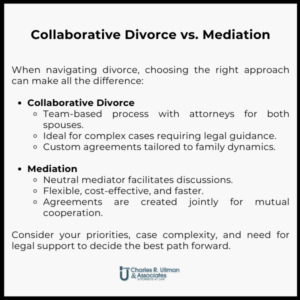
Divorce is challenging, but it doesn’t have to be a vicious fight. To protect your emotional health and control expenses, it is vital for you and your spouse to find the proper civil approach to your divorce.
Collaborative divorce and mediation provide alternatives to litigating your divorce. Which approach is right for you will depend on factors like the complexity of your household, the depth of your dispute, your communication styles, and your comfort working closely with professionals.
At Charles R. Ullman & Associates, we focus exclusively on family law matters, including collaborative divorce and mediation. We have over 25 years of experience providing legal representation to individuals who are ending their marriages. Charles R. Ullman is a board-certified family law specialist and a trained collaborative law attorney providing legal services with fairness and understanding.
If you are considering a collaborative divorce or mediation to work through the issues around the end of your marriage, contact our Raleigh firm for a consultation. Our compassionate divorce attorneys will take the time necessary to learn about your family circumstances and help you find workable solutions.
What Is Collaborative Divorce?
Collaborative divorce is a type of dispute resolution. It seeks to avoid the conflict, combativeness, and emotional distress that come with litigating a divorce in court. Each spouse is represented by their attorney. As a team-based process, all four people work to negotiate an agreement they can present to a family law judge.
The general concept of collaborative divorce is that couples should work through areas of disagreement informally if they can instead of having a judge settle their differences. When necessary, additional professionals are brought in to help, such as financial specialists, appraisers, or therapists.
Choosing this approach may have several benefits, such as:
- Tailor-made agreements – Because the collaborative divorce process is informal, the couple has a greater opportunity to produce results that address their specific needs. If needed, they can craft temporary agreements to establish some space while they focus on topics that require more work before they can agree on permanent arrangements. A couple may even set ground rules for handling post-divorce communication and decisions.
- Heavy legal guidance – Collaborative divorce best suits spouses who need strong legal advice and support, maybe because of a complex household or a family business to be divided. The process may benefit spouses who want to be more confident in understanding the legal aspects of asset division, child support, spousal support, and custody arrangements. Some like having their attorney at hand and exercising some control of proceedings.
Couples who agree to a collaborative divorce sign a “participation agreement.” If collaborative divorce negotiations fail, the two attorneys involved must resign from the case. Each spouse will need to hire a new attorney to represent them as they go to court.
If an agreement is reached, each spouse signs a legally binding document drafted by the attorneys. An agreement that serves the best interests of the couple’s underage children and treats each spouse equitably should be ratified by the court as the divorce agreement with no significant changes.
What Is Mediation?
In mediation, a specially trained neutral party helps a divorcing couple reach an agreement on the topics at hand. A mediator facilitates discussion so the spouses can arrive at solutions that fit their needs. Mediators do not make decisions for the couple. Because an agreement born from mediation for divorce comes from both spouses, they are less likely to violate its terms.
Divorce mediation is a flexible, informal process. Each spouse may have their lawyer with them and can bring in other professionals, such as financial advisors or property appraisers, as necessary.
As discussions unfold during mediation sessions, the mediator may suggest ideas and compromises to help the parties tailor a plan that meets their needs. They can meet with spouses separately to relay proposals and discuss issues when necessary.
As decisions are reached, the mediator will write out the terms for each spouse to sign. These documents can be presented to a family law judge to shape the couple’s divorce agreement. As in a collaborative divorce, the court should ratify a mediated agreement that treats each spouse equitably and is in the best interest of any children involved.
Key Differences: Collaborative Divorce vs. Mediation
 When deciding which approach would work best for your situation, there are some critical differences to consider:
When deciding which approach would work best for your situation, there are some critical differences to consider:
- Legal support – Pursuing a collaborative divorce ensures that you have legal advice at every turn as you negotiate your divorce agreement. A mediator can be a lawyer, or they could be a mental health professional, religious leader, or someone else trained in mediation techniques. Even if your mediator is an attorney, they do not represent your interests and cannot give either of you legal advice.
- Flexibility – A mediator will likely propose a schedule of sessions and an order for issues to be discussed. Mediation typically offers you more control over procedures, while in collaborative divorce, the two attorneys guide the process.
- Cost and efficiency – Mediation also tends to be faster and less expensive because fewer professionals are involved and its logistics are simpler.
With these distinctions in mind, you’ll want to determine which process fits your personal priorities, budget, and case complexity. You may also choose to use mediation within your collaborative divorce.
Contact a Raleigh Family Law Attorney About Traditional Divorce Alternatives
 Advising you about how collaborative divorce or mediation can be beneficial to you as you dissolve your marriage is one of the services that Charles R. Ullman & Associates provides clients like you in Raleigh and Wake County. Attorney Charles Ullman has extensive experience in collaborative divorce and mediation, as well as family law arbitration and contested divorce. One of our past clients says, “Charles Ullman understands what you’re going through and will be on your side the whole way through should you decide to hire him.”
Advising you about how collaborative divorce or mediation can be beneficial to you as you dissolve your marriage is one of the services that Charles R. Ullman & Associates provides clients like you in Raleigh and Wake County. Attorney Charles Ullman has extensive experience in collaborative divorce and mediation, as well as family law arbitration and contested divorce. One of our past clients says, “Charles Ullman understands what you’re going through and will be on your side the whole way through should you decide to hire him.”
Our law firm focuses solely on family law legal services and can offer a depth of experience and a friendly atmosphere that helps move your divorce toward productive results – regardless of the approach that is right for you. To learn more, contact our Raleigh family law office online or at (919) 829-1006 today.










